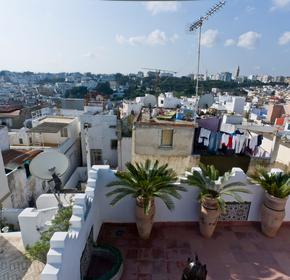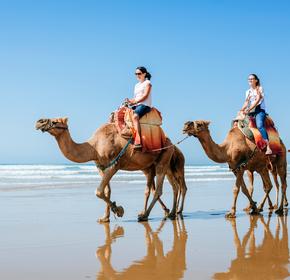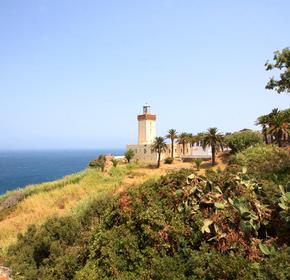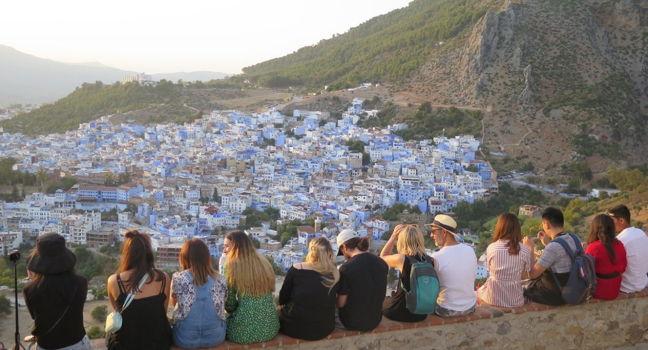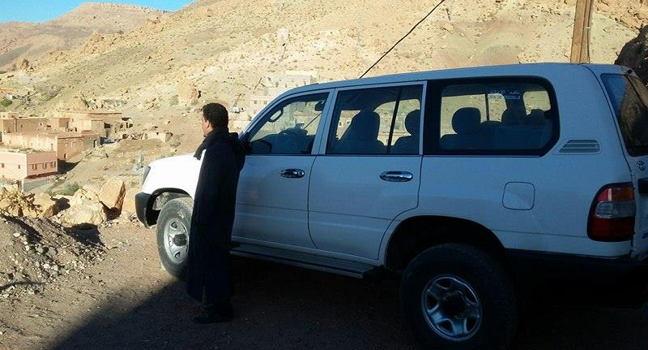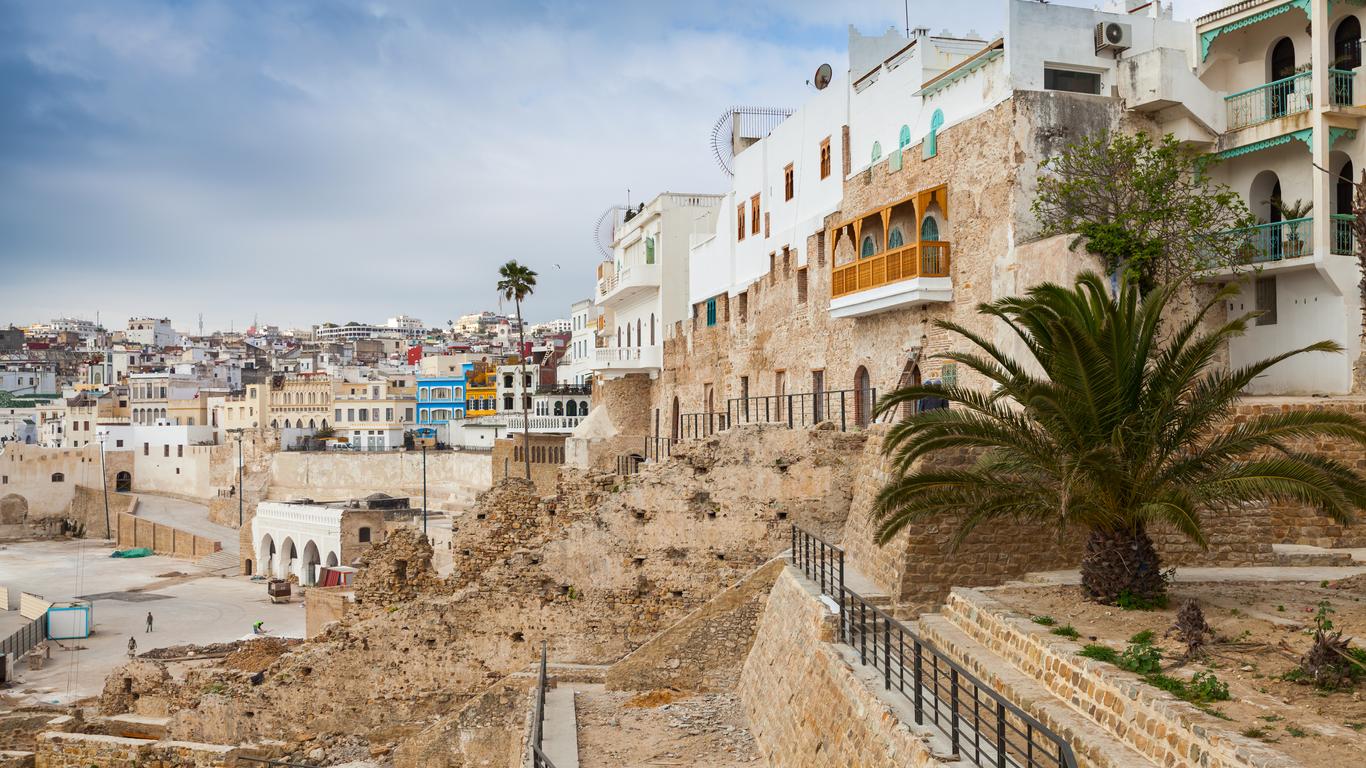
Tangier travel guide
Tangier Tourism | Tangier Guide
You're Going to Love Tangier
Nestled in the northeast corner of Morocco, the bustling city of Tangier has long been a haven for artists, writers, rock stars, and intellectuals. It's one of the country's most accessible destinations - just 20 miles from Spain across the Strait of Gibraltar.
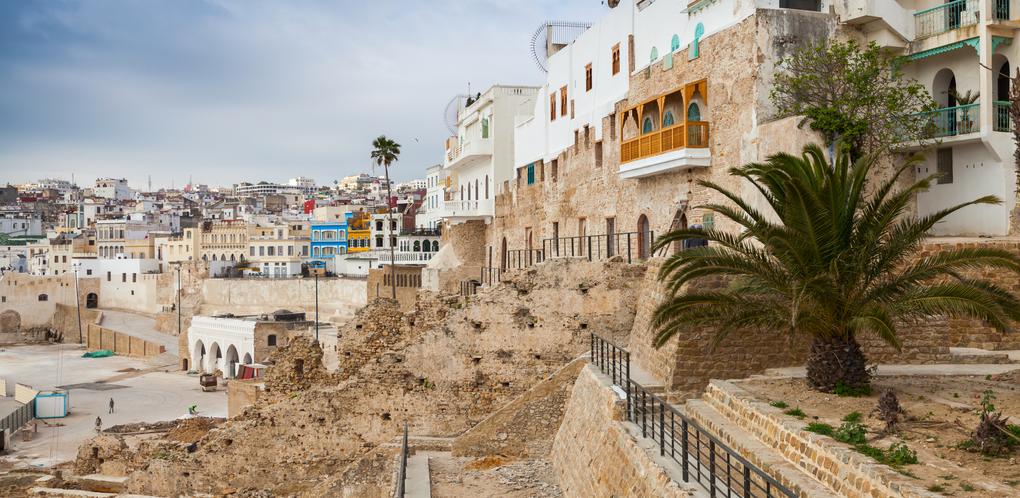
Its African roots are tempered by Spanish, Portuguese, and French influences. A blend of romantic medinas and alleyways, landmarks like the Sidi Bou Abib Mosque, and gorgeous Mediterranean beaches make the 'white city' an attractive option for all age groups.
Whether you're looking for surf, sea, and sun or whether you want to follow in the footsteps of illustrious visitors like Paul Bowles, William S. Burroughs, and Henri Matisse, you're sure to enjoy a memorable stay in Tangier.
Top 5 Reasons to Visit Tangier
1. Cap Spartel
Tangier lies where the Atlantic Ocean and the Mediterranean Sea meet at Cap Spartel on the western Maghreb coast. Take a tour of the Caves of Hercules where the mythical hero is said to have rested after his labors, see the almost 160-year-old lighthouse, or enjoy spectacular sunsets from this popular viewpoint.
2. The Medina and Kasbah
The Tangier Medina, a beautiful whitewashed stretch of shops and stalls, radiates from Grand Socco, an impressive square that's perfect for people watching. Stroll on the Kasbah's 17th-century fortified ramparts or take a closer look at the region's history at the Kasbah Museum, home to the Musée des Arts Marocains et des Antiquités, or at the Tangier American Legation Museum, off Rue du Portugal.
3. Its Famous Cafes
Tangier was an International Zone from 1932 to 1956 and writers, rock stars, and artists congregated in its many cafes. Recall the times of writer and composer Paul Bowles and sip mint tea on the terraces at Café Hafa (Avenue Hadj Mohamed Tazi) as you gaze over the Strait of Gibraltar or visit Cafe Baba (1 Rue Sidi-Hosni) where a picture of Keith Richards still hangs on the wall.
4. Palais Mendoub and the Mendoubia Gardens
The Palais Mendoub was once the home of Malcolm Forbes, and the American billionaire hosted fabulous parties that recalled the famously decadent gatherings thrown by Woolworth's heiress Barbara Hutton that put Tangier on the jet-set map. Across the road, the delightful Mendoubia Gardens is where locals meet to walk, talk, and play football.
5. The Shopping
Tangier is one of the most popular places for shopping and you'll find some of the best arts and crafts, including brass, ceramics, leather goods, jewelry, and carpets in the souks (markets). Bargaining is both expected and welcomed in Morocco.
What to do in Tangier
1. Medina: The Vibrant Heart of Tangier
Once known for the sordid allure that attracted artists, eccentrics, and shady arms dealers, Tangier has swept away decades of neglect and a lot of its seedy reputation with massive new development, including high-speed rail, sleek boutique hotels, and a $650 million overhaul of its port and marina. Yet all that modernization has done little to diminish the vibrant spirit and gritty idiosyncratic appeal that's been rocking the Kasbah (the residential hilltop section above the Medina) for centuries. Contained by the walls of a 15th-century fortress, the Medina in Tangier is a complex maze of narrow streets and alleyways inundated with the smell of mint tea and spices along with the occasional call to prayer and the staccato haggling of carpet traders. Vendors offer just about anything, from hand-crafted ceramics, fruits, flowers, silks, and slippers to a stuffed camel spleen sandwich.
2. Hercules Caves: Hercules Slept Here
According to legend, these caves just outside Tangier are where Hercules slept after using his superhuman strength to smash through a mountain and form the Straits of Gibraltar, a feat necessary to complete one of his 12 labors. A dwelling since the Neolithic Age, as well as an exotic brothel before tourism took foot, the part natural, part man-made caves are known for their sea window, curiously shaped like the African continent. The thousands of disc-shaped indentations on the walls and ceiling are attributed to centuries of quarrying for millstones, or possibly Hercules' clawing finger.
3. Plage Municipale: Every Town Needs A Beach
No need to leave town to enjoy the surf, Tangier's wide bay offers the warm, gentle waters of the Mediterranean along the sweeping sands of its very own Municipal Beach. Edged with beach clubs, discos, and cafes and modernized with new equipment and water sport activities, Tangier and less crowded nearby spots are fast becoming one of the world's premier beach destinations.
4. Musée de la Kasbah: Moroccan Arts and Antiquities
Relics exhibiting Tangier's fascinating multi-cultural history from as far back as the Stone Age are housed at the Museum of Moroccan Arts and Antiquities, commonly referred to as the Kasbah Museum. Located in the palace of a former sultan just outside the Medina, highlights include a beautiful mosaic of Venus from the Roman city of Volubilis, ancient Phoenician trade route maps, and the quiet respite of a stroll through the fragrant orange trees, flowers, and ceramic pottery gracing the Sultan's Garden.
5. Cap Spartel: The Tip of Africa
A short drive from Tangier through La Montagne's royal palaces and exclusive villas leads to the lush vegetation and sweeping views that surround the lighthouse of Cap Spartel, the continent's northwestern extreme. Known to the Romans as "the cape of the vines", Cap Spartel juts out high over the rocky coast, and its quiet nearby beaches make it a perfect day outing.
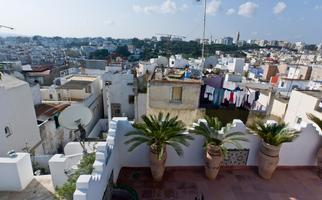
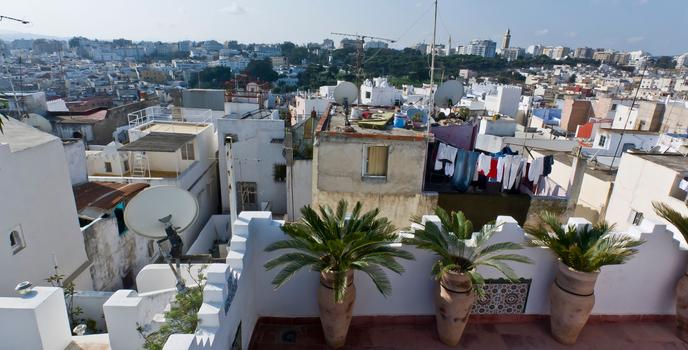
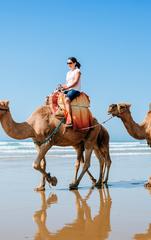
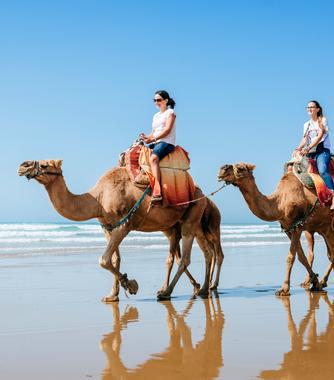
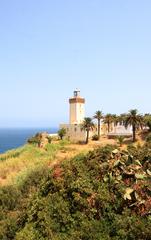
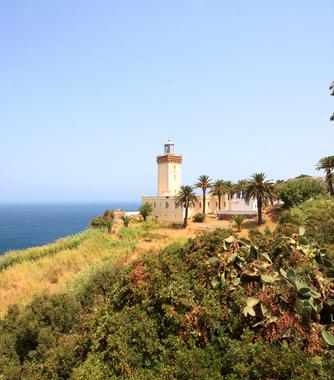
1. Medina: The Vibrant Heart of Tangier
Once known for the sordid allure that attracted artists, eccentrics, and shady arms dealers, Tangier has swept away decades of neglect and a lot of its seedy reputation with massive new development, including high-speed rail, sleek boutique hotels, and a $650 million overhaul of its port and marina. Yet all that modernization has done little to diminish the vibrant spirit and gritty idiosyncratic appeal that's been rocking the Kasbah (the residential hilltop section above the Medina) for centuries. Contained by the walls of a 15th-century fortress, the Medina in Tangier is a complex maze of narrow streets and alleyways inundated with the smell of mint tea and spices along with the occasional call to prayer and the staccato haggling of carpet traders. Vendors offer just about anything, from hand-crafted ceramics, fruits, flowers, silks, and slippers to a stuffed camel spleen sandwich.
2. Hercules Caves: Hercules Slept Here
According to legend, these caves just outside Tangier are where Hercules slept after using his superhuman strength to smash through a mountain and form the Straits of Gibraltar, a feat necessary to complete one of his 12 labors. A dwelling since the Neolithic Age, as well as an exotic brothel before tourism took foot, the part natural, part man-made caves are known for their sea window, curiously shaped like the African continent. The thousands of disc-shaped indentations on the walls and ceiling are attributed to centuries of quarrying for millstones, or possibly Hercules' clawing finger.
3. Plage Municipale: Every Town Needs A Beach
No need to leave town to enjoy the surf, Tangier's wide bay offers the warm, gentle waters of the Mediterranean along the sweeping sands of its very own Municipal Beach. Edged with beach clubs, discos, and cafes and modernized with new equipment and water sport activities, Tangier and less crowded nearby spots are fast becoming one of the world's premier beach destinations.
4. Musée de la Kasbah: Moroccan Arts and Antiquities
Relics exhibiting Tangier's fascinating multi-cultural history from as far back as the Stone Age are housed at the Museum of Moroccan Arts and Antiquities, commonly referred to as the Kasbah Museum. Located in the palace of a former sultan just outside the Medina, highlights include a beautiful mosaic of Venus from the Roman city of Volubilis, ancient Phoenician trade route maps, and the quiet respite of a stroll through the fragrant orange trees, flowers, and ceramic pottery gracing the Sultan's Garden.
5. Cap Spartel: The Tip of Africa
A short drive from Tangier through La Montagne's royal palaces and exclusive villas leads to the lush vegetation and sweeping views that surround the lighthouse of Cap Spartel, the continent's northwestern extreme. Known to the Romans as "the cape of the vines", Cap Spartel juts out high over the rocky coast, and its quiet nearby beaches make it a perfect day outing.






Activities & attractions in Tangier
Where to Eat in Tangier
Try fragrant tagine and other classic Moroccan dishes at Le Nabab (Rue Zaouiah Kadiria) or El Morocco Club (Place du Tabor). For a really special meal, order m'choui (whole roasted lamb) a day in advance and enjoy spectacular views over the Strait of Gibraltar at the city's most opulent restaurant, El Korsan (El Minzah Hotel). Chez Abdou (Foret Diplomatique) at the beach serves delicious seafood, while Le Fabrique in Rue d'Angleterre offers stylish French cooking with an Asian twist. Expect to pay DH150 for a basic meal or from DH500 for dinner in a good restaurant.
When to visit Tangier
Visit Tangier in late spring from March to May or in late summer from September to November for pleasant weather and fewer crowds. Peak season is from June to August and although all attractions are open, the city can be very busy as numbers are boosted by day visitors coming from Spain. Bring warm clothing if you're visiting in winter as temperatures can become chilly from December to February.
How to Get to Tangier
Plane
Tangier Ibn Battouta Airport (TNG) is just 7.5 miles from the city. Take a taxi to the city for DH100 in the daytime and DH150 at night. If you're on a budget, walk to the main road (one mile) and take a local bus (7 or 17) to the Grand Socco.
Train
Trains from cities such as Marrakesh and Fez arrive at Tanger Ville rail station each day. The station is a short distance from the center of the city, so take a petit taxi for DH40.
Car
If you're driving from Spain, take the ferry from Tarifa to the Port of Tangier or from Algeciras to the Tanger-Med port. The Port of Tangier is close to the city while Tanger-Med is 25 miles from downtown. Cars can be brought into Morocco for a maximum of six months each year, and you should check this with the rental company if you're renting a car in Spain. You'll need to have 'green card' insurance to drive in Morocco and it can be obtained at the port.
Bus
Operators such as Eurolines offer regular services to Tangier. A typical trip from Malaga costs DH796 and includes the ferry crossing. Eurolines buses terminate at the Gare Routière de Tanger on Avenue Idriss and petit and grand taxis can then be caught to your final destination in the city. Buses from other Moroccan cities such as Chefchaouen and Rabat arrive at either the CTM bus terminal at the port or at the bus station on Place Jamia Al Arabia.
Airlines serving Tangier
Where to stay in Tangier
Choose boutique hotels like Hôtel Villa Joséphine or La Maison de Tanger, or treat yourself to a stay at the luxurious El Minzah Hotel, the city's best-known 5-star hotel. Other upscale hotels include Hotel Atlas Rif and Spa on Avenue Mohammed VI and Mövenpick Hotel and Casino, while Hotel Continental or Kasbah Rose are good mid-range alternatives.
Popular Neighborhoods in Tangier
Old Medina – the hillside above the port is where you'll find the city's historical medina and the 17th-century fortified Kasbah. Walk from Grand Socco down to Petit Socco via Rue es-Siaghin past dozens of shops selling arts and crafts.
Ville Nouvelle – the city's new town is south of the port and the Old Medina. The district is centered around Place de France and Boulevard Pasteur with its many stores, restaurants, and cafes. Highlights include St. Andrew's Church on Rue d'Angleterre.
Marshan – this central neighborhood is bordered by Avenue Hadj Mohamed Tazi and Avenue Sidi Bou Arraqia. Marshan hotels are within easy reach of the Palais Marshan, the Grand Mosque of Tangier, and the Kasbah Museum.
Where to stay in popular areas of Tangier
Most booked hotels in Tangier
How to Get Around Tangier
Public Transportation
The city is quite compact so many visitors find that walking is the easiest way to get around. If you prefer to take the bus, useful routes include bus 13 from the rail station to the Port of Tangier via Avenue Mohammed VI and the 17 service from the bus station to the train station. A single trip costs DH5.
Taxi
If you don't want to navigate Tangier on foot, take one of the readily available petit taxis or grand taxis. Licensed petit taxis are blue and can be found at the airport and popular tourist sites. You'll pay DH85 for a 5-mile journey. Cream-colored grand taxis are not licensed and are more expensive. A typical 5-mile trip is DH120.
Car
It's easy to drive in Tangier, although some areas are pedestrianized. The main roads are Boulevard Mohamed VI (previously Ave des FAR), which goes from the port to Malabata along the beachfront, and Boulevard Mohamed V from the Ville Nouvelle to the medina. A compact car from leading rental companies like Europcar costs from DH316 per day.
The Cost of Living in Tangier
Shopping Streets
Watch pottery, rugs, jewelry, and throws being made at the Ensemble Artisanal on Rue de Belgique before you buy, or shop for ready-made items in the souks. Try Boutique Majid (Rue les Almouhades) in the heart of the souk for gorgeous antique robes, fabric, and Moroccan furniture.
Groceries and Other
Popular local stores include Sabrine Supermarket, Atacadão Tanger, and Al Baraka Supermarché, and prices are DH8 for a quart of milk and DH12 for a dozen eggs.
